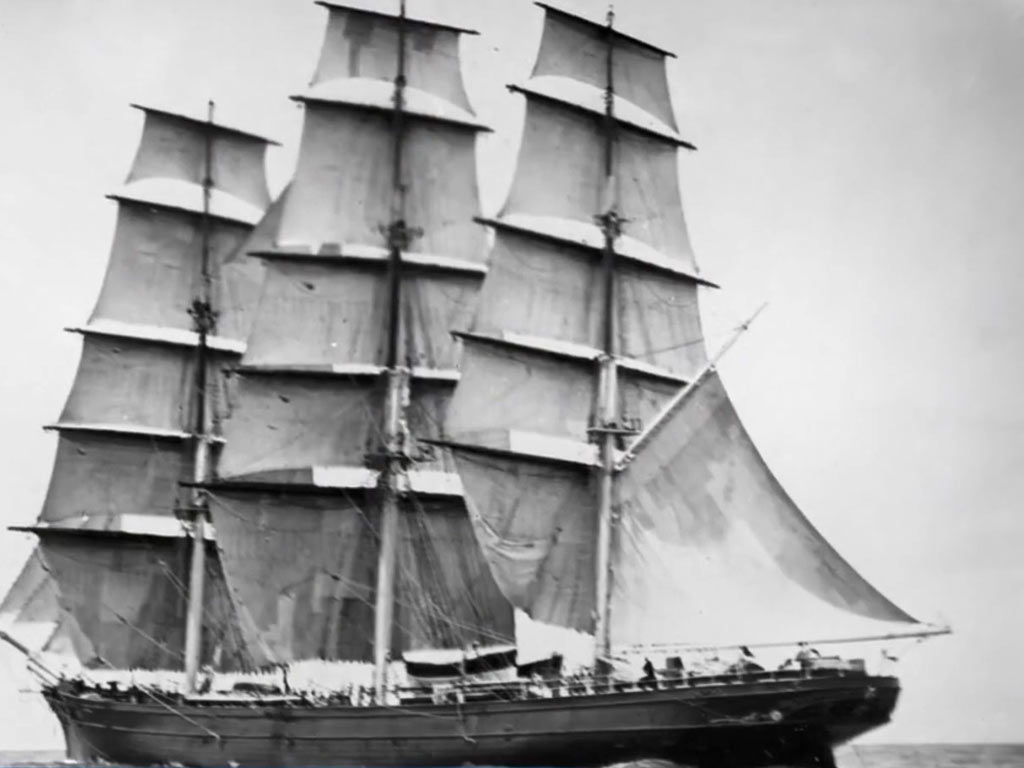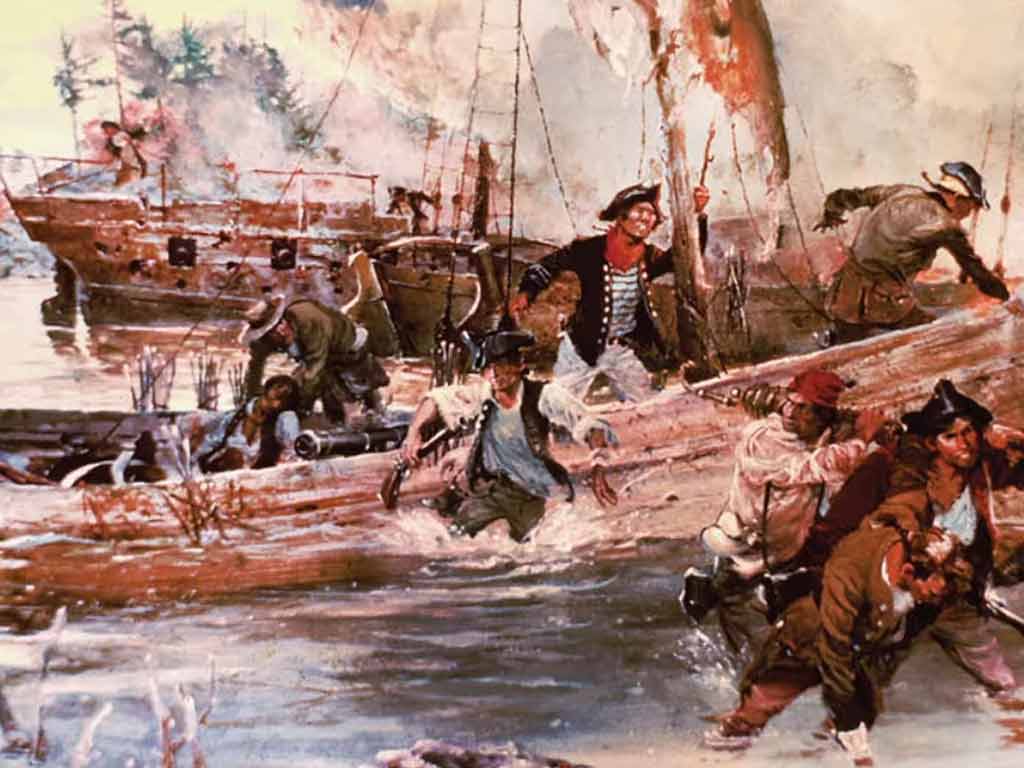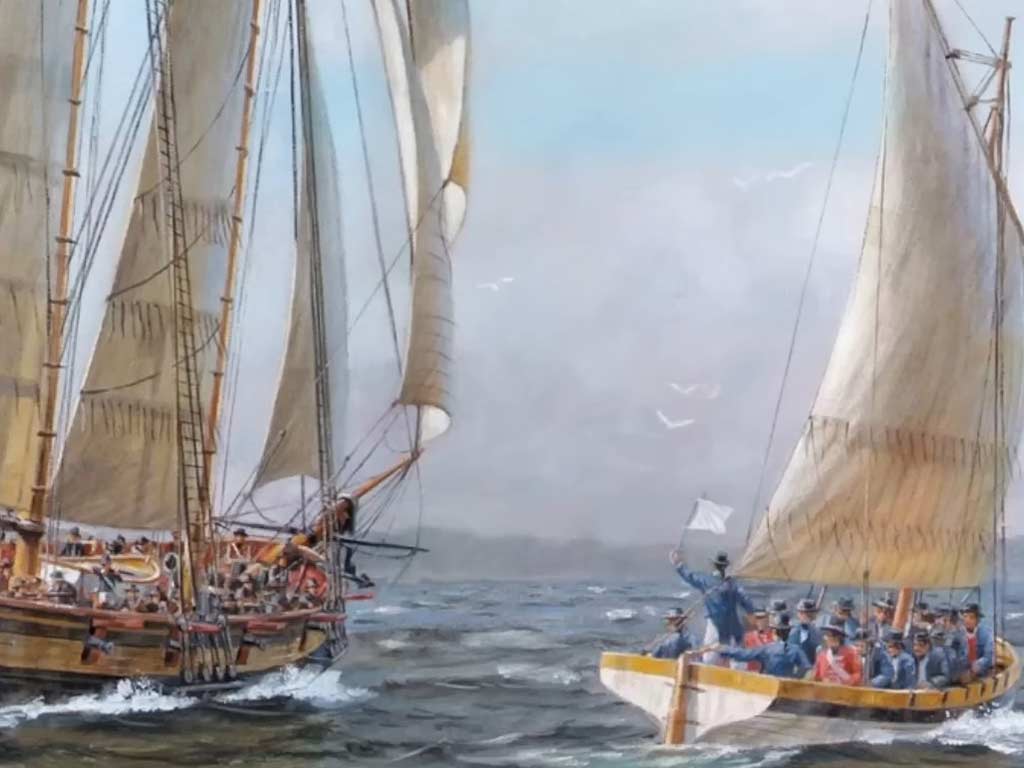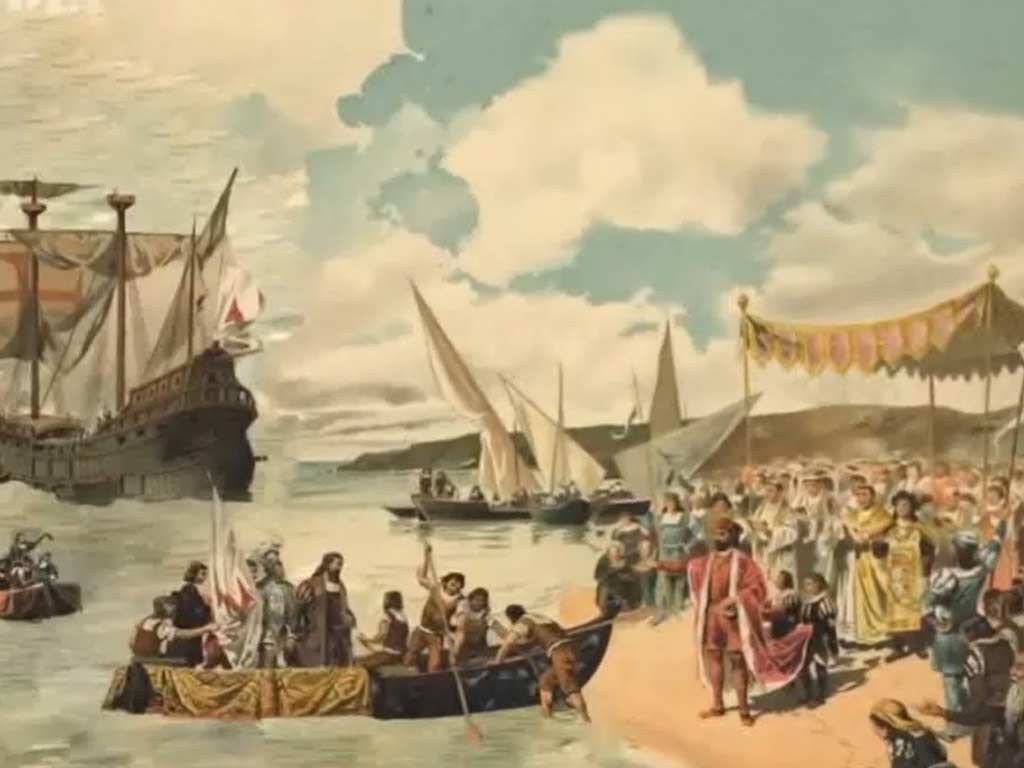The Maritime History of Massachusetts stands as a dynamic chronicle woven into the very fabric of American and global maritime narratives.
From the early days of European exploration and colonization to the bustling maritime trade of the 19th century, Massachusetts has been a pivotal player in shaping seafaring history.
The state’s strategic coastal positioning, natural harbors, and innovative contributions to shipbuilding have etched its name in the annals of maritime significance.
Beginning with the European arrival in the 17th century, Massachusetts swiftly evolved into a maritime powerhouse, birthing coastal communities that thrived on fishing, trade, and naval engagements.
The Golden Age of Whaling saw the rise of iconic whaling hubs like New Bedford, solidifying Massachusetts’ dominance in the global whaling industry.
Technological innovations, such as clipper ships, propelled the state into the forefront of maritime commerce. So, stay sharp.
Maritime History of Massachusetts
The maritime history of Massachusetts is deeply rooted in the state’s rich legacy, marked by a longstanding connection to the sea that has played a pivotal role in shaping its cultural, economic, and political identity.
From the early days of colonization to the bustling maritime trade of the 19th century, Massachusetts has been a maritime powerhouse, contributing significantly to the growth and development of the United States.
This historical journey unfolds through tales of exploration, trade, fishing, and naval exploits, illustrating the enduring impact of the maritime heritage on the Bay State.
The Age of Exploration and Early Colonization

In the early 17th century, Massachusetts became a focal point for European exploration and colonization.
The allure of abundant natural resources, fertile land, and a strategic geographic location drew seafaring adventurers and settlers to the region.
This period laid the foundation for the maritime traditions that would shape the state’s destiny.
The Golden Age of Whaling
By the 18th and 19th centuries, Massachusetts had emerged as a global center for whaling.
Coastal towns such as New Bedford and Nantucket became synonymous with the whaling industry, with Massachusetts ships venturing into distant oceans in pursuit of the prized sperm whale.
This era of maritime commerce brought wealth and prosperity to the state, but it also left an indelible mark on the maritime landscape.
The Revolutionary Maritime Spirit

During the American Revolution, Massachusetts played a crucial role in the formation of the Continental Navy. The state’s strategic ports and maritime expertise became vital assets in the fight for independence.
Naval engagements off the Massachusetts coast, including the famous Battle of Bunker Hill, underscored the significance of maritime power in the struggle for freedom.
Clipper Ships and the Maritime Economy
In the mid-19th century, Massachusetts witnessed the rise of clipper ships, and sleek and fast vessels that revolutionized maritime trade.
These vessels, designed for speed and efficiency, dominated global trade routes, connecting Massachusetts to international markets.
The bustling maritime economy fostered innovation, technological advancements, and a flourishing seafaring culture.
The Impact of the Industrial Revolution
The Industrial Revolution brought transformative changes to Massachusetts’ maritime landscape.
Steam-powered ships, advances in shipbuilding technology, and the expansion of maritime infrastructure reshaped the state’s waterfronts.
The integration of new technologies propelled Massachusetts into a modern era of maritime commerce, leaving a lasting imprint on its maritime identity.
Decline and Revival
As the 20th century progressed, Massachusetts experienced a decline in traditional maritime industries.
Changing global dynamics, technological shifts, and economic challenges led to the waning prominence of sectors like whaling and commercial fishing.
However, in recent decades, the state has witnessed a maritime revival, with a focus on marine research, sustainable practices, and the preservation of its maritime heritage.
Maritime History of Massachusetts – The Beginning

The maritime history of Massachusetts has its roots deeply embedded in the early days of European exploration and colonization.
As one of the original thirteen colonies, Massachusetts played a crucial role in shaping the maritime destiny of the United States.
This journey began with the arrival of European settlers, the allure of the abundant natural resources, and the strategic positioning of Massachusetts that drew the attention of seafaring pioneers.
The Age of Exploration and Early Colonization
In the early 17th century, Massachusetts became a focal point for European explorers seeking new opportunities and challenges across the Atlantic.
The Massachusetts Bay Colony, founded in 1630, marked the beginning of sustained European settlement in the region.
The proximity to the Atlantic Ocean offered fertile grounds for the establishment of coastal communities, each with a burgeoning connection to maritime activities.
The arrival of the Mayflower in 1620 and the subsequent establishment of the Plymouth Colony laid the foundation for the maritime traditions that would shape the state’s identity.
Coastal towns like Salem, Boston, and Plymouth emerged as vital hubs for trade, fishing, and shipbuilding, setting the stage for Massachusetts’ maritime prominence.
As the colonies developed, maritime commerce became an integral part of daily life.
Fishing expeditions ventured into the rich waters of the Atlantic, contributing not only to the settlers’ sustenance but also laying the groundwork for Massachusetts’ future as a major fishing center.
This early period of exploration and colonization marked the genesis of a maritime legacy that would evolve over the centuries.
The maritime landscape of Massachusetts in its early days was characterized by wooden sailing vessels, rudimentary navigational techniques, and the challenges of navigating the unpredictable Atlantic waters.
Despite these obstacles, the early settlers forged a connection to the sea that would endure through subsequent centuries, shaping the state’s economy, culture, and sense of identity.
The maritime history of Massachusetts begins with these foundational chapters, colonization, and the establishment of a maritime tradition that would propel the state into a future marked by seafaring prowess and maritime influence.
European Colonization in the Maritime History of Massachusetts

The maritime history of Massachusetts is intricately woven into the tapestry of European colonization in North America.
As one of the earliest regions to be explored and settled by European pioneers, Massachusetts played a pivotal role in shaping the destiny of the New World.
This narrative unfolds against the backdrop of the Atlantic Ocean, where navigators and settlers embarked on perilous journeys, laying the foundations for a maritime legacy that would endure for centuries.
Exploration and Early Contacts
The European exploration of the North American coast gained momentum in the late 15th and early 16th centuries.
Pioneering figures such as John Cabot, Giovanni da Verrazzano, and Jacques Cartier navigated the Atlantic waters, making intermittent contact with the indigenous peoples inhabiting the lands that would later become Massachusetts.
These early interactions set the stage for subsequent waves of exploration and eventual colonization.
The Mayflower Compact and the Pilgrims
In 1620, the Mayflower, carrying a group of English Separatists known as the Pilgrims, anchored off the shores of what is now Provincetown, Massachusetts.
Seeking religious freedom, the Pilgrims drafted the Mayflower Compact, a foundational document that established a form of self-governance.
The compact marked the first instance of a written framework for governance in the New World and foreshadowed the democratic principles that would later shape the United States.
The Massachusetts Bay Colony

In 1630, a larger wave of English settlers arrived in the region under the leadership of Governor John Winthrop, establishing the Massachusetts Bay Colony.
This event marked the beginning of sustained European colonization in the area, with the settlers founding communities along the coastline.
The strategic location of these settlements facilitated maritime trade and laid the groundwork for Massachusetts’ emergence as a maritime powerhouse.
Trade and Commerce
The natural resources of Massachusetts, coupled with its proximity to the Atlantic Ocean, made it an ideal hub for maritime trade.
Coastal towns like Salem and Boston became vital centers for commerce, fostering trade networks that extended to Europe, the Caribbean, and beyond.
The maritime economy thrived on activities such as fishing, shipbuilding, and the export of goods, shaping the economic landscape of the colony.
Navigational Challenges and Technological Advancements
The early years of European colonization in Massachusetts were marked by navigational challenges, treacherous coastlines, and unpredictable weather.
Yet, over time, technological advancements in ship design and navigation improved the efficiency and safety of maritime journeys.
These innovations contributed to the expansion of trade routes and the strengthening of Massachusetts’ maritime influence.
Struggles and Conflicts with Indigenous Peoples
The process of European colonization in Massachusetts was not without conflicts. The arrival of settlers led to tensions and clashes with the indigenous peoples who had inhabited the region for centuries.
These struggles for land and resources underscored the complex interactions between European colonizers and the Native American inhabitants, shaping the course of Massachusetts’ early maritime history.
The American Revolution in the Maritime History of Massachusetts
The American Revolution marked a transformative period in the maritime history of Massachusetts, as the state played a crucial role in the struggle for independence.
The strategic positioning of Massachusetts along the Atlantic coast, coupled with its thriving maritime economy, made it a key theater for naval engagements, trade disruptions, and revolutionary fervor.
This chapter in the state’s maritime history unfolds against a backdrop of naval battles, privateering, and the resilience of coastal communities during a tumultuous time.
Naval Engagements and the Continental Navy

As tensions between the American colonies and Great Britain escalated, Massachusetts emerged as a critical hub for naval activities.
The Massachusetts Naval Militia, established in 1775, played a vital role in defending the coastline.
Notable naval engagements such as the Battle of Machias and the Battle of Gloucester showcased the determination of Massachusetts to resist British naval dominance.
Privateering and Maritime Warfare
Privateering became a significant aspect of Massachusetts’ maritime contributions to the American cause during the Revolution.
Privateers, privately owned and armed vessels authorized by the Continental Congress, operated out of Massachusetts ports to disrupt British maritime trade.
These privateers played a pivotal role in weakening British supply lines and bolstering the American war effort.
Siege of Boston and Naval Blockades
The Siege of Boston (1775–1776) marked a critical phase in the early stages of the Revolution.
The British naval presence in Boston Harbor prompted the Continental Army to establish fortifications and initiate a blockade.
The naval blockade limited British access to supplies and reinforcements, contributing to the eventual withdrawal of British forces from Boston in 1776.
The Penobscot Expedition
In 1779, Massachusetts participated in the ill-fated Penobscot Expedition, an attempt to dislodge a British fort in present-day Maine.
The expedition ended in disaster for the American forces, highlighting the challenges and complexities of naval operations during the Revolutionary War.
Despite this setback, the experience contributed to the development of the fledgling United States Navy.
Post-Revolutionary Maritime Rebuilding
The aftermath of the Revolutionary War brought challenges and opportunities for Massachusetts’ maritime economy. The disruption caused by war and British blockades required a rebuilding of the state’s maritime infrastructure.
Shipbuilding, trade, and fishing industries experienced a resurgence, laying the groundwork for Massachusetts to regain its status as a maritime powerhouse in the years following the Revolution.
Legacy and Impact on Maritime Identity
The maritime contributions of Massachusetts during the American Revolution left an enduring legacy.
The experiences of naval engagements, privateering, and the strategic importance of coastal defense shaped the state’s maritime identity.
The lessons learned during this tumultuous period influenced the development of the United States Navy and underscored the inseparable link between maritime prowess and national independence.
A Global Hub of Maritime History

Massachusetts stands as a global hub of maritime history, with a legacy that spans centuries and encompasses diverse facets of seafaring life.
From early European exploration to the Golden Age of Whaling, the state has played a central role in shaping maritime commerce, naval power, and cultural connections across the oceans.
This narrative unfolds against the backdrop of Massachusetts’ strategic coastal positioning, fostering a dynamic relationship with the sea that has left an indelible mark on its history.
Exploration and Early Colonization
As European explorers set sail across the Atlantic, Massachusetts became a focal point of early exploration and colonization.
The natural harbors and navigable waterways attracted settlers, laying the foundation for coastal communities that would evolve into vital maritime centers.
The state’s role in the Age of Exploration helped define its identity as a maritime gateway to the New World.
The Golden Age of Whaling
Massachusetts rose to prominence during the Golden Age of Whaling in the 18th and 19th centuries.
Coastal towns like New Bedford and Nantucket became global whaling hubs, sending ships across the oceans in pursuit of valuable whale oil.
The success of Massachusetts’ whaling industry not only fueled economic prosperity but also established the state as a leader in global maritime trade.
Innovation and Clipper Ships
The mid-19th century witnessed Massachusetts’ emergence as a center of maritime innovation with the rise of clipper ships.
Sleek, fast vessels designed for maximum efficiency, clipper ships dominated global trade routes, connecting Massachusetts to ports worldwide.
This era of innovation showcased the state’s maritime prowess and technological advancements in ship design.
Industrial Revolution and Modernization
As the Industrial Revolution unfolded, Massachusetts experienced a maritime transformation.
Steam-powered ships, advances in shipbuilding technology, and the expansion of maritime infrastructure reshaped the state’s waterfronts.
These changes positioned Massachusetts as a key player in modern maritime commerce, contributing to global trade networks and economic growth.
Notable Naval Contributions
Throughout history, Massachusetts has made significant contributions to naval power.
From the American Revolution, where its ports witnessed naval engagements and blockades, to the present day, with the state hosting important naval bases and institutions, Massachusetts continues to play a vital role in ensuring maritime security and defense.
Cultural Heritage and Maritime Museums
Massachusetts’ maritime legacy is preserved and celebrated through numerous museums and cultural institutions.
Maritime museums like the New Bedford Whaling Museum and the USS Constitution Museum showcase the state’s seafaring heritage, providing a tangible link to the past and fostering an appreciation for Massachusetts’ global impact on maritime history.
The state’s dynamic relationship with the sea has left an enduring legacy that continues to shape its identity, connecting the rich tapestry of Massachusetts’ maritime history to the broader narrative of global seafaring heritage.
Historical Significance of Maritime Massachusetts

Maritime Massachusetts holds a profound historical significance that transcends regional borders, encompassing pivotal moments in American history and contributing to global maritime narratives.
The state’s strategic coastal positioning, innovative contributions to shipbuilding, robust maritime economy, and pivotal role in historical events make it a cornerstone in the tapestry of maritime heritage.
This exploration of maritime Massachusetts reveals a legacy that resonates not only regionally but also on the broader stage of world history.
Colonial Foundations and Economic Growth
From its early colonial foundations, Massachusetts’ coastline became a crucible for economic growth and cultural exchange.
The state’s navigable waters, rich fisheries, and natural harbors attracted settlers, establishing prosperous maritime communities that laid the groundwork for future prosperity.
The maritime economy became integral to the colony’s success, setting the stage for Massachusetts to emerge as a key player in American maritime history.
The American Revolution and Naval Power
During the American Revolution, Massachusetts played a crucial role in shaping the course of history through maritime endeavors.
The state’s ports witnessed naval engagements, privateering, and the strategic blockade of British-held Boston.
The Massachusetts Naval Militia and privateer vessels underscored the importance of naval power, contributing to the overall success of the revolutionary cause and leaving an indelible mark on the state’s maritime identity.
Golden Age of Whaling
Massachusetts achieved global prominence during the Golden Age of Whaling in the 18th and 19th centuries.
Coastal towns like New Bedford and Nantucket became epicenters of whaling, sending ships across the world’s oceans in pursuit of valuable whale oil.
This era not only fueled economic prosperity but also established Massachusetts as a dominant force in the whaling industry, shaping the state’s maritime legacy.
Innovation and Technological Advancements
The mid-19th century witnessed Massachusetts at the forefront of maritime innovation.
The state’s shipbuilders led the way in designing and constructing clipper ships, revolutionizing global trade with vessels known for their speed and efficiency.
Technological advancements in navigation, ship design, and propulsion systems further solidified Massachusetts’ position as a hub of maritime excellence.
Immigrant Contributions and Cultural Exchange
Massachusetts’ maritime history reflects a tapestry of cultural exchange and immigrant contributions.
Diverse communities, drawn to the state’s maritime opportunities, brought unique skills and traditions that enriched the fabric of Massachusetts’ maritime identity.
This cultural exchange is evident in the state’s coastal towns, where the influences of various maritime cultures endure to this day.
Modern Maritime Legacy
Today, Massachusetts continues to uphold its maritime legacy through naval bases, research institutions, and a commitment to sustainable maritime practices.
The state’s contributions to maritime security, technological advancements, and marine research demonstrate an ongoing dedication to shaping the future of maritime endeavors.
FAQs
What role did Massachusetts play in the American Revolution’s maritime history?
Massachusetts played a pivotal role, witnessing naval engagements, privateering, and strategic blockades.
Its ports were critical in securing independence, showcasing the state’s maritime prowess during this transformative period.
How did the Golden Age of Whaling impact Massachusetts’ maritime history?
The Golden Age of Whaling brought prosperity to Massachusetts, making coastal towns like New Bedford global whaling hubs.
The industry fueled economic growth, establishing the state as a dominant force in whaling and shaping its maritime legacy.
What technological innovations emerged from Massachusetts in maritime history?
Massachusetts led maritime innovation in the mid-19th century, pioneering clipper ship design.
These fast and efficient vessels revolutionized global trade, showcasing the state’s contributions to technological advancements in navigation and shipbuilding.
How did the Maritime Economy of Massachusetts evolve post-Revolutionary War?
Post-Revolution, Massachusetts faced challenges but experienced a maritime resurgence.
The rebuilding phase saw a revitalization of shipbuilding, trade, and fishing industries, setting the stage for the state to regain its status as a maritime powerhouse.
What is the modern legacy of Massachusetts in maritime endeavors?
Today, Massachusetts maintains its maritime legacy through naval bases, research institutions, and a commitment to sustainable practices.
The state’s contributions to maritime security and technological advancements reflect a continued dedication to shaping the future of maritime endeavors.
Wrapping Up
In delving into the Maritime History of Massachusetts, a captivating narrative of exploration, resilience, and global influence unfolds.
From its colonial foundations, where navigable waters and natural harbors beckoned settlers, to the Golden Age of Whaling that propelled the state to international maritime prominence, Massachusetts stands as a maritime powerhouse.
The echoes of the American Revolution resonate through naval engagements and privateering, underscoring the state’s strategic significance.
Technological innovations, such as the iconic clipper ships, showcased Massachusetts’ prowess in shaping global trade.
The maritime legacy persists in modern times, with naval bases, research institutions, and a commitment to sustainable practices.
Massachusetts’ maritime journey is a testament to its enduring impact on economic, cultural, and naval spheres, contributing not only to the state’s identity but also leaving an indelible mark on the broader narrative of seafaring heritage. Best wishes.
Jaclyn Lowe